Serving 359 students in grades Prekindergarten-5, Housman Elementary School ranks in the bottom 50% of all schools in Texas for overall test scores (math proficiency is bottom 50%, and reading proficiency is bottom 50%).
The percentage of students achieving proficiency in math is 27% (which is lower than the Texas state average of 41%). The percentage of students achieving proficiency in reading/language arts is 41% (which is lower than the Texas state average of 51%).
The student:teacher ratio of 12:1 is lower than the Texas state level of 14:1.
Minority enrollment is 94% of the student body (majority Hispanic), which is higher than the Texas state average of 75% (majority Hispanic).
Quick Stats (2025)
- Grades: Prekindergarten-5
- Enrollment: 359 students
- Student:Teacher Ratio: 12:1
- Minority Enrollment: 94%
- Overall Testing Rank: Bottom 50% in TX
- Math Proficiency: 27% (Btm 50%)
- Reading Proficiency: 41% (Btm 50%)
- Science Proficiency: 25-29% (Btm 50%)
- Source: National Center for Education Statistics (NCES), TX Dept. of Education
Top Rankings
Housman Elementary School ranks among the top 20% of public schools in Texas for:
Category
Attribute
Percent Eligible For Free Lunch
Student Attention
School Overview
Housman Elementary School's student population of 359 students has declined by 31% over five school years.
The teacher population of 29 teachers has declined by 12% over five school years.
Grades Offered
Grades Prekindergarten-5
Total Students
359 students
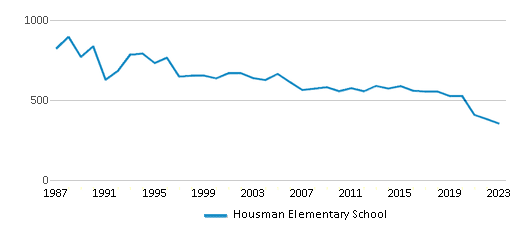
Gender %
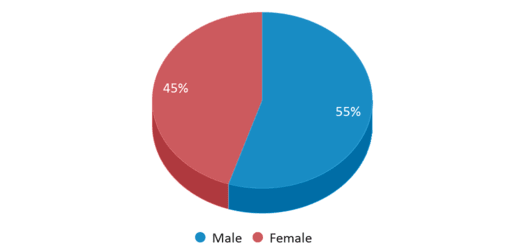
Total Classroom Teachers
29 teachers
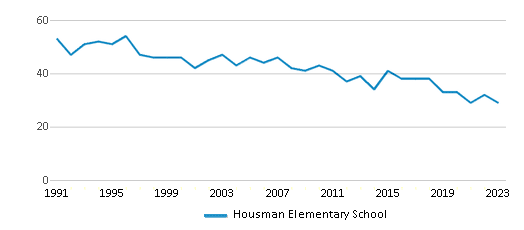
Students by Grade
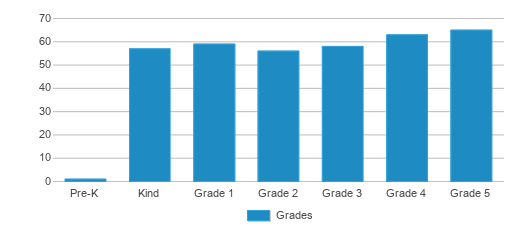
School Rankings
Housman Elementary School ranks within the bottom 50% of all 8,188 schools in Texas (based off of combined math and reading proficiency testing data).
The diversity score of Housman Elementary School is 0.30, which is less than the diversity score at state average of 0.64. The school's diversity has stayed relatively flat over five school years.
Overall Testing Rank
#6304 out of 8188 schools
(Bottom 50%)
(Bottom 50%)
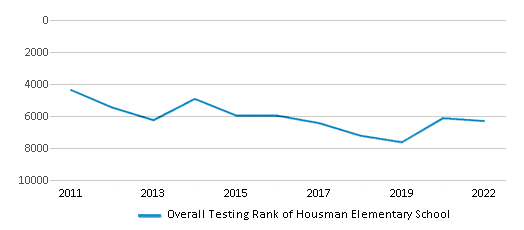
Math Test Scores (% Proficient)
27%
41%
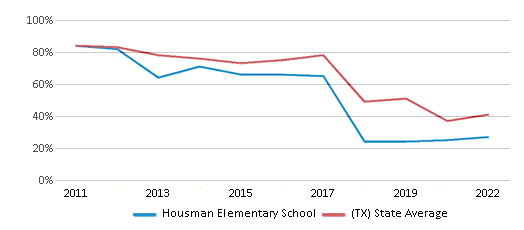
Reading/Language Arts Test Scores (% Proficient)
41%
51%
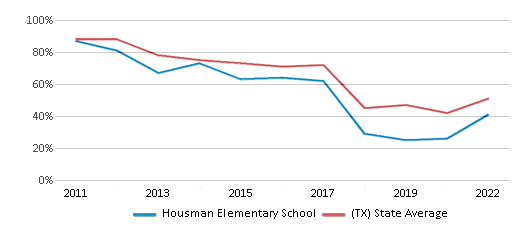
Science Test Scores (% Proficient)
25-29%
46%
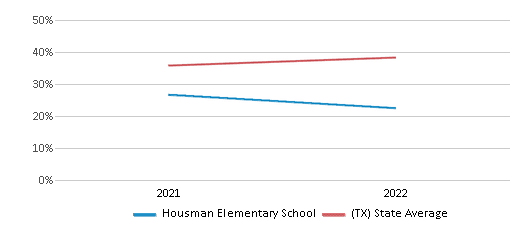
Student : Teacher Ratio
12:1
14:1
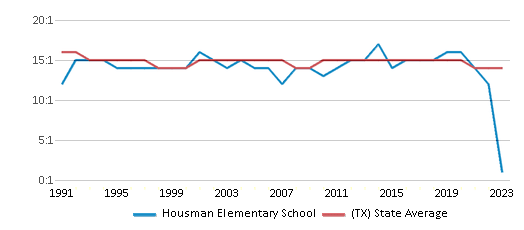
American Indian
n/a
n/a
Asian
1%
6%
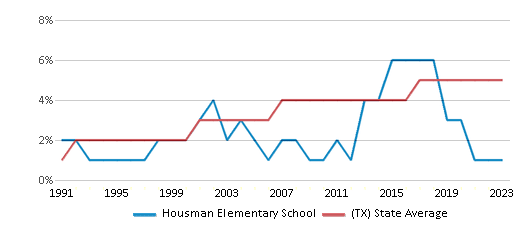
Hispanic
83%
53%
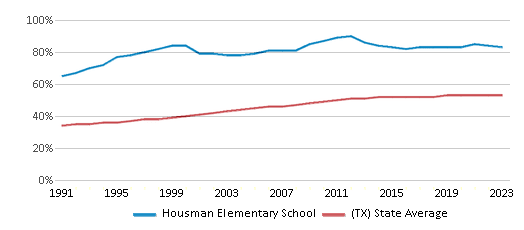
Black
9%
13%
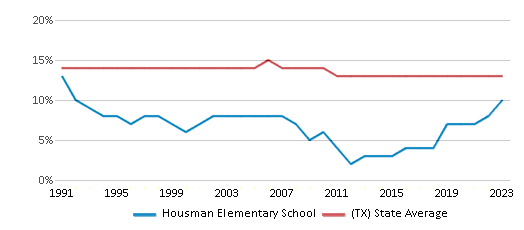
White
6%
25%
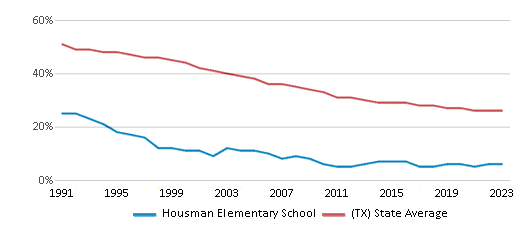
Hawaiian
n/a
n/a
Two or more races
1%
3%
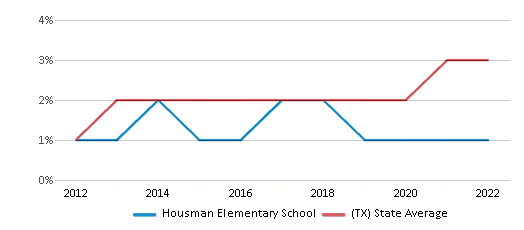
All Ethnic Groups
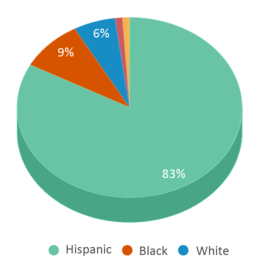
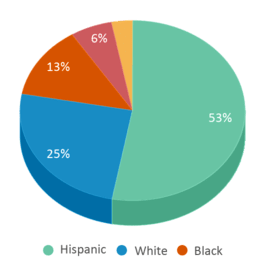
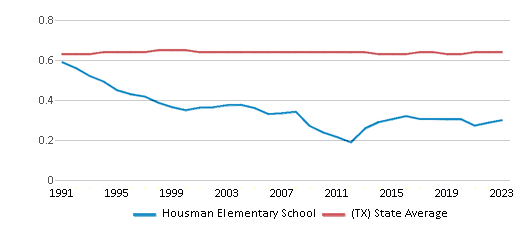
Participates in the National School Lunch Program (NSLP)
Yes
Eligible for Free Lunch
89%
57%
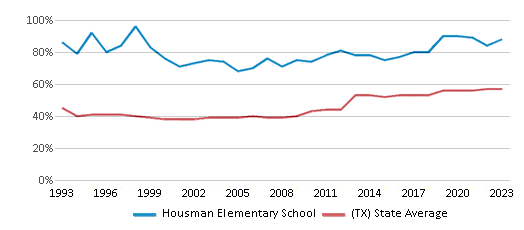
Eligible for Reduced Lunch
3%
5%
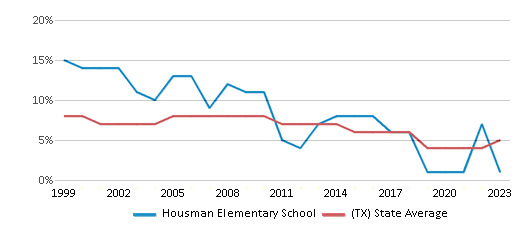
School Statewide Testing
School District Name
Source: National Center for Education Statistics (NCES), TX Dept. of Education
Profile last updated: 02/09/2025
Frequently Asked Questions
What is Housman Elementary School's ranking?
Housman Elementary School is ranked #6304 out of 8,188 schools, which ranks it among the bottom 50% of public schools in Texas.
What percent of students have achieved state testing proficiency in math and reading?
27% of students have achieved math proficiency (compared to the 41% TX state average), while 41% of students have achieved reading proficiency (compared to the 51% TX state average).
How many students attend Housman Elementary School?
359 students attend Housman Elementary School.
What is the racial composition of the student body?
83% of Housman Elementary School students are Hispanic, 9% of students are Black, 6% of students are White, 1% of students are Asian, and 1% of students are Two or more races.
What is the student:teacher ratio of Housman Elementary School?
Housman Elementary School has a student ration of 12:1, which is lower than the Texas state average of 14:1.
What grades does Housman Elementary School offer ?
Housman Elementary School offers enrollment in grades Prekindergarten-5
What school district is Housman Elementary School part of?
Housman Elementary School is part of Spring Branch Independent School District.
In what neighborhood is Housman Elementary School located?
Housman Elementary School is located in the Northwest Houston neighborhood of Houston, TX. There are 16 other public schools located in Northwest Houston.
School Reviews
4 11/2/2018
In my opinion. The new principle and teachers are doing the best they can. They are new and trying to work out the mess that has been left behind. With time I can see an improvement. As with any school that had a former principle and teachers that didn't care it takes time to restructure. I have noticed a strong willingness from principle and teacher to improve things. It won't happen over night. But I foresee with time things will change. The school Starts way to early in the morning ! Children are tired. Other schools start later the reason for this is a rested child is more willing to learn. Before the new staff bullying was blown off. The old principle aloud my child to be bullied. It's not allowed now. Drop off was a mess in the past. As I've mentioned before there are several kinks to be worked out in this school. But I'm noticing people with a strong willingness to improve things. And it's a positive thing for me.
Review Housman Elementary School. Reviews should be a few sentences in length. Please include any comments on:
- Quality of academic programs, teachers, and facilities
- Availability of music, art, sports and other extracurricular activities
Recent Articles

What Is A Charter School?
Explore the world of charter schools in this comprehensive guide. Learn about their history, how they operate, and the pros and cons of this educational innovation. Discover key facts about charter schools, including admission policies, demographics, and funding, as well as what to look for when considering a charter school for your child.

10 Reasons Why High School Sports Benefit Students
Discover the 10 compelling reasons why high school sports are beneficial for students. This comprehensive article explores how athletics enhance academic performance, foster personal growth, and develop crucial life skills. From improved fitness and time management to leadership development and community representation, learn why participating in high school sports can be a game-changer for students' overall success and well-being.

February 05, 2025
Understanding the U.S. Department of Education: Structure, Impact, and EvolutionWe explore how the Department of Education shapes American education, from its cabinet-level leadership to its impact on millions of students, written for general audiences seeking clarity on this vital institution.






